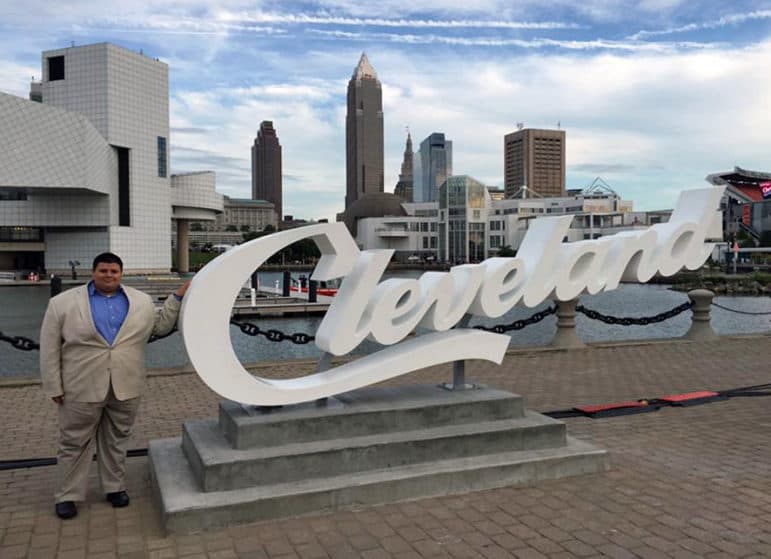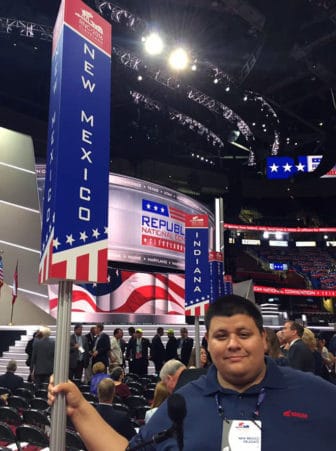
Courtesy photo
Samuel LeDoux in Cleveland, the site of the 2016 Republican National Convention, on Sunday.
Donald Trump wasn’t Samuel LeDoux’s first choice to be the Republican nominee for president. But at this point LeDoux believes Trump is the candidate most likely to stop Democrat Hillary Clinton, so he’s backing the presumptive GOP nominee.
As one of New Mexico’s delegates to this week’s Republican National Convention in Cleveland, LeDoux hopes the event unifies the GOP.
“I hope to bring party unity, and I hope we can use the convention to reflect on who we are as a party,” LeDoux said. “I hope Mr. Trump has the strength and will to bring us together in Cleveland before it’s too late.”
LeDoux made his comments in an interview NMPolitics.net conducted by email — the latest in our Q&A series with people involved in New Mexico politics and government.
LeDoux, 24, recently won the impressive support of 54 percent of state delegates in a 33-person race to become a delegate to the national convention. The Española native has worked for the state and Santa Fe County GOP organizations and in 2014 worked on Gov. Susana Martinez’s re-election campaign.

Courtesy photo
Samuel LeDoux on the floor of the Republican National Convention in Cleveland on Monday.
It was Martinez, along with others including U.S. Sen Marco Rubio, who inspired LeDoux to become a Republican. Staffers from Martinez’s 2010 campaign for governor spoke at Pojoaque Valley High School, where LeDoux was a student at the time. “I agreed with almost everything Governor Martinez stood for and decided to register Republican so I could vote for her in the primary and get involved in county party politics,” he said.
This year, LeDoux preferred Jeb Bush and Rubio over Trump in the presidential race. He said he has “never been a fan of Trump’s style of expressing his message.” But Trump has some inclusive qualities and “has brought a lot of attention to the very real border crisis that exists in our country,” LeDoux asserts.
And he believes Trump has drawn new people into the political process whose voices shouldn’t be ignored.
Here’s our full interview, with questions in bold and LeDoux’s answers immediately following:
You recently gathered an impressive level of support to be elected by New Mexico Republicans as a delegate to this week’s RNC Convention. How big was your win? How did you do it?
It honestly was a lot larger than I expected. I came in first place in Congressional District 3; I earned the support of 54 percent of the state delegates in a 33-man race (much more than I expected based on my initial count heading in). I thought if I made it, I’d just barely make it. I had a much bigger appeal in Farmington and Rio Rancho than I anticipated. I believe I won because I put the most energy into it. I started campaigning in December and I went to places most delegate candidates didn’t; for example, I was the only candidate who traveled to Union County for their last convention before the state one in CD3. I also had a large amount of support in the north-central counties — Santa Fe, Rio Arriba, Taos, and San Miguel.
Tell us a little bit about yourself — where you’re from, what you do, your background in politics.
I was raised in Española, New Mexico, and am a graduate of Pojoaque Valley High School. I am also a graduate of Northern New Mexico College (AA in Business Administration and General Studies) and New Mexico Highlands University (BBA in Management). My fathers’ family has lived in New Mexico for hundreds of years, and my mothers’ family is from the Midwest. I got interested in politics when staff from Susana Martinez’s 2010 primary campaign spoke to us at Pojoaque High School’s Political Day in 2010. I agreed with almost everything Governor Martinez stood for and decided to register Republican so I could vote for her in the primary and get involved in county party politics. I became actively involved in the Santa Fe County Republican Party in 2011, becoming an “At Large” member of the executive committee. In 2012, I interned with the State Party promoting Mitt Romney in Santa Fe. From 2013 until just last month I was the First Vice Chair of the Santa Fe GOP. In 2014, I was the field representative in San Miguel County for Governor Susana Martinez’s re-election campaign. My current position is field director for John McCain’s re-election campaign in Northern Arizona. When Senator McCain’s campaign ends, I plan on attending New Mexico State University to earn an MBA.
The GOP is dealing with some serious division right now. What’s your take on what has happened to the Republican Party this year? Where do you see it heading in the future?
Honestly I don’t think the party is anymore divided than it’s ever been. Historically speaking, the party has always had outspoken members who were against the nominee. The nature of being a big tent and an opposition party is that we often have people from wildly different ideologies uniting around individualism. When you compare this primary to those like in 1976, the fracturing is almost non-existent. I think it’s only getting more attention than usual because Mr. Trump has brought more attention to the party than it has seen in a long time. I think people forget just how divided the party was in 2004, 2008, and 2012.
Do you support Donald Trump’s candidacy for president? Why or why not?
I do, simply because he is the best alternative out there to Hillary Clinton. I also think Trump has helped tear down the barrier of entry to politics and has gotten people, way more people, interested in the subject. Love him or hate him, I think he’s done a lot for democracy. He’s also shown people that politics isn’t all about money and that someone can win the nomination of a major party without the help of large donors. Finally, I think Trump is the only presidential candidate that will stand for our right to keep and bear arms.
Was Trump your first choice? If not, who was and why?
No, he wasn’t. I never really had a first choice — it was a toss up between Marco Rubio and Jeb Bush. Jeb always struck me as a kind and genuine person, someone who was willing to lead and stand by his principles no matter how unpopular they were. Rubio was a person, along with Governor Martinez, who really inspired me to become a Republican. Rubio had a strong commanding voice in the United States Senate and I was really impressed when I got to meet him in 2012 at a Heather Wilson event. I felt as if Jeb and Rubio really understood the Latino people better than the rest of the field and that they could connect with the issues in my home community of Española. Ultimately, when I make my political decisions, I try to think about how these decisions will affect my hometown because that is what is most important to me.
Trump has regularly said things that many people and groups in America hear as insults — including people of color, Mexicans, Muslims, women, journalists, and people with disabilities. What would you say to people who have felt insulted by Trump about why they should support him?
I have never been a fan of Trump’s style of expressing his message. I’m a more relaxed, conservative man, which explains why I was more attracted to the types of messages Jeb Bush gave. However, I think if you read in between the lines, Trump has been more inclusive than one may think. Trump has openly courted the LGBT vote and has supported trans people using the restroom of their choice. While I may not have agreed with how he said it, I do feel that the uncontrolled immigration problem has led to citizen Latinos having their wages artificially decreased and has forced many undocumented people to live in the shadows and either be exploited with low and sometimes illegal wages or live in fear of the cartel. I also think that because the U.S. has ignored this problem, it has caused the Mexican government to not address the issue. Trump has brought a lot of attention to the very real border crisis that exists in our country.
Trump has repeatedly spoken about the nation’s corrupt campaign finance system and railed against free trade agreements — two issues on which he shares some common ground with Democrat Bernie Sanders and his supporters. Do you think Trump can win the votes of a significant number of people who supported Sanders in the Democratic primary? Why or why not?
I do believe he can if he messages it correctly; so many people have been hurt by the slowness of the recovery from the 2008/2010 recessions. I think Mrs. Clinton isn’t doing herself any favors by praising President Obama’s handling of the economy.
Libertarian presidential nominee Gary Johnson appears to be drawing some Republicans away from the GOP’s presumptive presidential nominee. What would you say to Johnson’s supporters?
Honestly I think we in New Mexico overestimate just how popular Gary truly is simply because he’s in our backyard. You must remember that Johnson failed to capitalize on Ron Paul’s revolution of 2012, and with Rand’s poor performance in the presidential primary, I feel the Libertarian moment has passed. When it comes to poll numbers we must remember that Bob Barr was polling around 6-8 percent when included in 2008, but never even got close to that number at the polls. It’s a lot easier to tell a stranger on the telephone you’re voting third party than it is to actually do it.
What message do you have for prominent Republicans who have endorsed Clinton — like some former officials from the George W. Bush administration — and those like Jeb Bush who say they can’t vote for Clinton or Trump?
As you know from my earlier answers I’m a lot closer to Jeb ideologically than Mr. Trump. However, I feel it’s important to listen to the will of the people. In the article I wrote for your website, I think we who are used to leading need to use 2016 as a way to reconnect with the common man.
You’re working in Arizona right now on the re-election campaign of Republican Sen. John McCain. Talk about why you’re doing that.
Senator McCain is one of the politicians I have the upmost respect for; he works hard for what he believes in, he stays true to himself no matter how unpopular his decisions may be, and he’s always willing to listen to the people. I’ve been inspired by him since I was assigned to cover his visit to Albuquerque for our high school yearbook in 2008. I wasn’t old enough to vote, but as someone who’s had family in the military, I was moved by his Memorial Day speech. I think Senator McCain brings a unique, powerful, and honest voice to the United States Senate and we need to keep him there.
Do you see any contradiction between working for McCain, who more closely aligns with Clinton on many issues than he does Trump, and supporting Trump in the presidential race?
I think Senator McCain and Mr. Trump have more in common than he and Mrs. Clinton do. Senator McCain has endorsed Mr. Trump and respects the will of the people.
What message are you taking to the GOP convention? What do you hope is the outcome of the convention?
I hope to bring party unity, and I hope we can use the convention to reflect on who we are as a party. I hope Mr. Trump has the strength and will to bring us together in Cleveland before it’s too late.